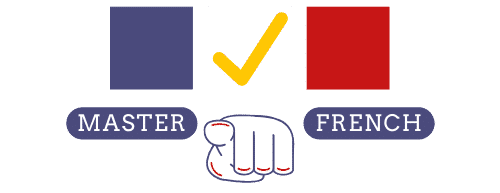18 French words you use in English without realizing it
Updated: 7 March, 2021 by Elie in French Vocabulary ▪

Influence of French language on English
The French language has greatly influenced the English vocabulary.
Up to 30% of the English words have their origin in French. Today, English speakers wouldn’t recognize many English words that come from French. Although, these French words are commonly used in English every day.
This is great news for English speakers looking to learn French. Of course, some words have changed their original meaning as they evolved in their new environment and culture.
Truth to be said, French and Latin words weren’t easily adopted by all English speakers. Many tried to propose native replacements to these terms when these words were new.
The French language: en marche
But the fates of languages cannot be predicted. These days English words are invading, not only French but also many other languages.
It is not surprising to hear that the French government attempts to protect the French language by creating new French terms to replace common Anglicisms.
Meanwhile, the growing number of French speakers as well as the many defenders of French are good signs that French is one of the most popular languages that foreigners want to learn.
Nevertheless, there is no better than quoting Victor Hugo, the famous French poet and novelist, to illustrate the constant changes in the French language:
“The French tongue is not fixed and never will be. A language does not become fixed. The human intellect is always on the march, or, if you prefer, in movement, and languages with it.”
French translation: “La langue française n’est pas fixée et ne se fixera point. Une langue ne se fixe pas. L’esprit humain est toujours en marche, ou, si l’on veut, en mouvement, et les langues avec lui.“
Now that you are aware that there are plenty of common French words used in English, I’m going to provide you with a list of 18 French-English cognates. But first, let me define what I mean by the word cognate.
What is a cognate?
By definition, cognates are words from two languages that are the same or similar. Examples of cognates in French and English are words like president, conclusion, solitude, actor, etc.
Such words are called cognates. Regardless of their roots, the following English words are the same, or almost the same, in French today.
Learn French with quotes
Vocabulary matters. But French culture matters too. For this reason, I invite you to discover some of the most beautiful quotes of Victor Hugo in which you’ll find words that are the same in French and English.
Again, Victor Hugo is a French poet and novelist as mentioned earlier in this article. He’s mostly known for writing the novels Les Misérables, 1862, and The Hunchback of Notre-Dame (French: Notre-Dame de Paris), 1831.

Which words are the same in French and in English?
If you know the following words in English then you’re all set with the associated French vocabulary. At the same time, you’ll be learning famous French proverbs.
With the rules that you’ll observe below, you’ll be able to generalize the acquired clues to a larger number of words that you, already, use in your daily conversations. That’s brilliant, no?
A list of 18 words that are identical in French and English:
- Accident
- Compliment
- Intelligent
- Capable
- Admirable
- Passion
- Religion
- Suggestion
- Architecture
- Nature
- Posture
- Impossible
- Invisible
- Visible
- Prison
- Artist (artiste in French)
- Future (futur in French)
- Invasion
With these 18 French terms used in English, not only you’ll instantly boost and grow your French vocabulary but also you’ll discover the best French quotes by Victor Hugo with their English translations. You’ll read these French phrases in English as well as in French.
French-English cognate patterns
In the following cognate patterns, you’ll often find French words used in English:
- French Words ending with “ent”
- French Words ending with “ble”
- French Words ending with “ion”
- French Words ending with “ure”
- French Words ending with “ible”
- More French words used in English
French words used in English
Now you have a list of 18 common French words used in English. In addition to that, let’s discover beautiful quotes by Victor Hugo in which these words are used.
When the word ends with “ent”
The rule for words that end with “ent” is very easy. Most of the words that end with “ent” are identical in French and English. Let’s see some examples.
1 – Accident
- Quote in English: Revolutions are not born of chance but of necessity.
- Quote in French: Les révolutions sortent, non d’un accident, mais de la nécessité.
2 – Compliment
- Quote in English: A compliment is like a kiss through a veil.
- Quote in French: Le compliment, c’est quelque chose comme le baiser à travers le voile.
3 – Intelligent
- Quote in English: An intelligent hell would be better than a stupid paradise.
- Quote in French: Mieux vaudrait encore un enfer intelligent qu’un paradis bête.

When the word ends with “ble”
Most French words that end with the suffix “ble” are identical in French and English. Here are three words that you can use similarly in French and English. The only difference is their pronunciation.
4 – Capable
- Quote in English: He who is not capable of enduring poverty is not capable of being free.
- Quote in French: Qui n’est pas capable d’être pauvre n’est pas capable d’être libre.
5 – Admirable
- Quote in English: Amnesty is as good for those who give it as for those who receive it. It has the admirable quality of bestowing mercy on both sides.
- Quote in French: Ce que l’amnistie a d’admirable et d’efficace, c’est qu’on y retrouve la solidarité humaine.

When the word ends with “ion”
Words that end with “ion” are also in the list of French words used in English. In the following, the words passion, religion, and suggestion are exactly the same words in both languages. Let’s read the citations from Victor Hugo.
6 – Passion
- Quote in English: The heart becomes heroic through passion. It is no longer composed of anything but what is pure; it no longer rests upon anything but what is elevated and great.
- Quote in French: Le cœur devient héroïque à force de passion : il ne se compose plus que de rien de pur ; il ne s’appuie plus que sur rien d’élevé et de grand.
7 – Suggestion
- Quote in English: Suggestion is to do in the minds of others a small incision where one puts an idea from oneself.
- Quote in French: La suggestion consiste à faire dans l’esprit des autres une petite incision où l’on met une idée à soi.
8 – Religion
- Quote in English: Religion is nothing but the shadow cast by the universe upon human intelligence.
- Quote in French: La religion n’est autre chose que l’ombre portée de l’univers sur l’intelligence humaine.

When the word ends with “ure”
As for the words that ends with “ure“, they are identical in French and English. Note that in French, most of these words are feminine. Here are 3 examples with the associated quotes from Victor Hugo.
9 – Architecture
- Quote in English: Architecture is the great book of humanity, the principal expression of man in his different stages of development, either as a force or as an intelligence.
- Quote in French: L’architecture est le grand livre de l’humanité, l’expression principale de l’homme à ses divers états de développement, soit comme force, soit comme intelligence.
10 – Nature
- Quote in English: Legendary truth is of another nature than historical truth. Legendary truth is invention whose result is reality.
- Quote in French: La vérité légendaire est d’une autre nature que la vérité historique. La vérité légendaire, c’est l’invention ayant pour résultat la réalité.
11 – Posture
- Quote in English: There are thoughts which are prayers. There are moments when, whatever the posture of the body, the soul is on its knees.
- Quote in French: Il y a des pensées qui sont des prières. Il y a des moments où, quelle que soit la posture de votre corps, l’âme est à genoux.

When the word ends with “ible”
French terms with “ible” as suffix follow also the same rule. For most of these words, they are the same in French and English.
12 – Invisible
- Quote in English: The memory is the invisible presence.
- Quote in French: Le souvenir, c’est la présence invisible.
13 – Visible/Invisible
- Quote in English: A man is not idle, because he is absorbed in thought. There is visible labor and there is an invisible labor.
- Quote in French: Il y a le labeur visible et le labeur invisible. Contempler, c’est labourer ; penser, c’est agir. Les bras croisés travaillent, les mains jointes font.
14 – Impossible
- Quote in English: Nothing is more imminent than the impossible.
- Quote in French: Rien n’est plus imminent que l’impossible.

More French sayings with French-English words
Below is another set of French sayings from the well known Victor Hugo. Similarly, these phrases include a number of common French words used in English.
15 – Prison
- Quote in English: He who opens a school door closes a prison.
- Quote in French: Celui qui ouvre une porte d’école, ferme une prison.
16 – Artist
- Quote in English: A great artist is a great man in a great child.
- Quote in French: Un grand artiste, c’est un grand homme dans un grand enfant.
A slight difference is that in French the word artist takes an “e” at the end of the word (artiste).

17 – Future
- Quote in English: What is history? An echo of the past in the future; a reflex from the future on the past.
- Quote in French: Qu’est-ce que l’histoire ? Un écho du passé dans le futur ; un réflexe du futur sur le passé.
In this case, it is the English word future that takes an extra “e” at the end of the word.
18 – Invasion
- Quote in English: An invasion of armies can be resisted, but not an idea whose time has come.
- Quote in French: On résiste à l’invasion des armées, on ne résiste pas à l’invasion des idées.
Is learning French an idea whose time has come?
If that’s the case, let’s start your French learning journey with Master Your French! You can find other articles on this blog to learn French greetings, to study how to ask for directions in French, among many other useful materials. To revisit some of your French vocabulary lists you can check the beginner’s guide to learn French vocabulary. Start speaking French as early as you can and you’ll gradually build up accuracy and fluency.
No wonder that English speakers who studied French at school, or on their own, are able to read texts and even books in French. It is great that English speakers are familiar with French vocabulary and that there are many common French words used in English as we saw in this article. However, to fully benefit from a foreign language it is not enough to learn reading and writing.
Beyond these essential skills, it is important and even enjoyable to speak French. In the end, as stated in one article about the use of phonetics in teaching elementary French: Language and sound must go together and the ear is an indispensable aid to the eye. Without an intelligible pronunciation, communicating with native speakers in French might not be successful. Here are 4 tips to improve your French pronunciation.
Don’t worry that your French is riddled with gaps and mistakes. It is only by practicing that you’ll be able to eliminate many difficulties that stand in the way of intelligibility.
Go to Master Your French YouTube channel and watch the videos to learn to pronounce French. Or better join the online French courses to master your French.

